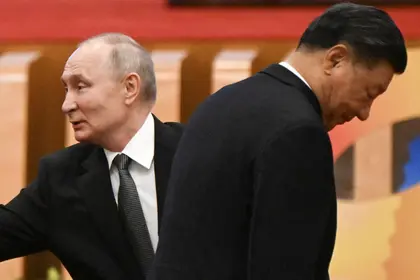China remains on the sidelines of Russia’s war but is the conflict’s biggest beneficiary. It does not sell weapons, but imports cheap energy from Russia and exports refrigerators and consumer products in return. China has talked about peace, but it wants more war, said Czech Republic President Petr Pavel.
“It is in China’s interest to prolong the status quo because it can push Russia to a number of concessions. It is also good for China that the West is probably becoming a little bit weaker by supporting Ukraine.”
JOIN US ON TELEGRAM
Follow our coverage of the war on the @Kyivpost_official.
Thus Beijing bides its time as Russia hurtles toward the same fate as did the Soviet Union which dissolved in 1991 following an expensive war of attrition in Afghanistan. In Russia’s southwest corner, there are already some restive “republics,” comprised of Turkic majorities, with resources and burgeoning independence movements.
But the biggest prize and question mark is on the other side of the Ural Mountains: Siberia (“sleeping land” in Turkic) which is as large and resource-rich as Canada. It borders Central Asia, Mongolia, and China and if, or when, Putin falters, China will pounce.
Siberia is the “sleeping land”

Putin Signs Law Letting Ukraine Fighters Write Off Bad Debts
The first target will be Outer Manchuria, stolen from China by Russia in the mid-19th century. It is an area the size of Nigeria and includes Vladivostok, the coastal area along the Sea of Japan, Sakhalin Island, and the Kuril Islands.
These territories have a population of 4.5 million, untapped natural gas and iron ore along their coastlines, and significant amounts of oil and gas in Sakhalin. It is empty and underdeveloped. By contrast, Inner Manchuria (still part of China) is a dynamic province with a population of 107 million that has been industrialized and become a trade hub. Beijing would gladly reclaim all of Manchuria if the war ends badly for Putin. And there is little doubt that a weak and crumbling Russia might be willing or forced to divest these lands for a price, or that the area may simply come up for grabs.
China has established other regions of “economic hegemony” along its border with Russia. Only 500,000 ethnic Chinese currently reside inside the Russian Federation, but several Chinese cities with millions of residents have sprouted along the border. They have built factories, farms, and businesses that provide goods and services that Russians are uninterested or incapable of producing.
Manchuria is the most successful example and illustrates the stark difference between the two countries. Russia’s Blagoveshchensk is a sleepy border town with a population of 211,000 and across the river Amur is industrialized China’s Heihe with 1.673 million people.
Moscow and Beijing have waged border wars for centuries but in the 1980s a Sino-Russian coalition developed -- a marriage of convenience that coalesced in order to counteract American influence and to facilitate trade. Then the relationship between the two nations profoundly changed after the Feb. 24, 2022 invasion of Ukraine. The unprovoked aggression not only upended international norms, but President Xi Jinping had no idea this was going to happen when he signed a “no limits partnership” with Putin just days before the incursion.
Since then, Xi has distanced himself from Putin. China has not condemned the invasion nor supplied weapons. But it has refused to impose sanctions on Moscow, and its energy purchases, along with India’s, finance Putin’s war and benefit the two economies.
At the same time, however, Beijing has cautiously pivoted toward the West following the imposition of America’s protectionist Chips Act which restricts its access to vital semiconductor technology. Beijing also wrestles with friend shoring, low economic growth, and debt issues due to its own mismanagement. The result is that the two superpowers regularly meet to try and resolve differences concerning trade, tech, and Taiwan.
But the minute that Russia wobbles, China will jump at the chance to grab Manchuria as well as to gain control over Russia’s sparsely populated Far Eastern Federal District, which includes a vast Arctic region and the entire Pacific Ocean coastline. Uniting Manchuria with this hinterland, would turn China into a major powerhouse.
The Far Eastern Federal District in yellow
But this is some time off because Russia’s war is far from finished. While the outcome is uncertain, there’s little question that the world slowly witnesses an end to the last European colonial empire. Currently, the Russian elite in Moscow and St. Petersburg live like royalty and terrorize citizenry and neighbors across 11 time zones. But this is not sustainable.
Russia’s military cannot beat a smaller foe, and its GDP is smaller than China’s industrialized Province of Guangdong outside Hong Kong. Putin’s 2022 attempt to re-occupy the “colony” of Ukraine will prove to be suicidal. He destroys his economy and his nation’s future. Eventually, Europe’s last empire will atomize and end up in pieces.
Thus China waits.
The views expressed in this opinion article are the author’s and not necessarily those of Kyiv Post.
Reprinted from [email protected] - Diane Francis on America and the World
See the original here.
You can also highlight the text and press Ctrl + Enter









